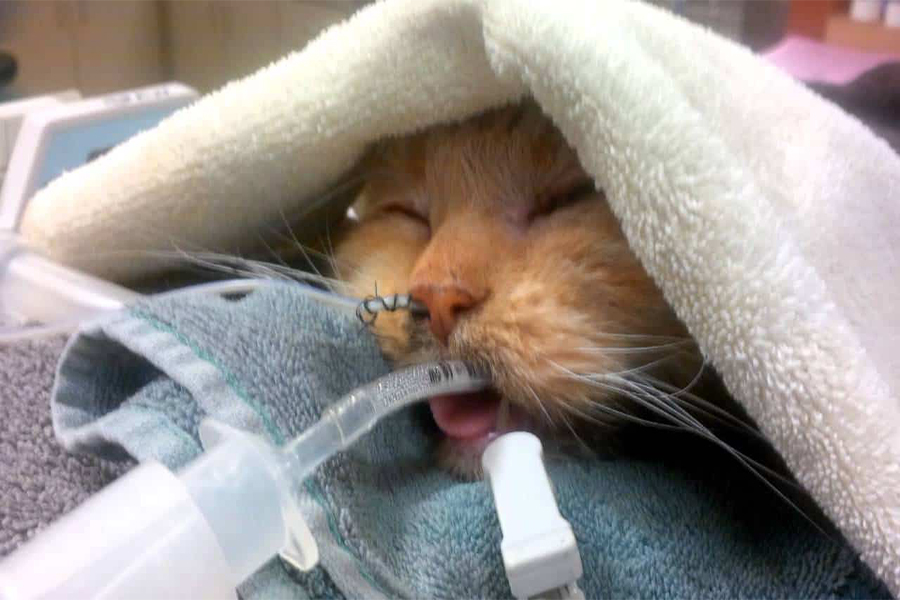
Do you have a cat? If so, you should know about FIV. Feline immunodeficiency virus (FIV) is a virus that affects cats. It’s important to know about this virus, especially if you have an outdoor cat or if your cat has been in close contact with other cats. Keep reading to learn more about FIV and what you can do to keep your cat healthy.
FIV stands for Feline Immunodeficiency Virus – the cat version of HIV (Human immunodeficiency Virus), which causes AIDS (Acquired Immunodeficiency Syndrome) in humans. Cats can be born FIV-positive; they can also become FIV-positive after being bitten by an infected cat. FIV is passed on through bites, scratches or deep lacerations to the skin. It is not airborne, so it cannot be caught by humans or any other animals.
Being FIV-positive means that the cat has antibodies that have been exposed to the virus, although it can take years, if ever, before the cat develops any FIV infection and clinical signs referred to as Feline AIDS (Acquired Immunodeficiency Syndrome of Cats).

What Is FIV in Cats (Feline Immunodeficiency Virus)?
FIV is a virus that attacks a cat’s immune system, making them more susceptible to other infections and illnesses. There is no cure for FIV, however, cats with the virus can live long and healthy lives with proper care and treatment. Early detection and diagnosis of FIV is important in order to begin treatment as soon as possible. Common symptoms of FIV include fever, weight loss, poor appetite, and general lethargy. If your cat is exhibiting any of these symptoms, please contact your veterinarian right away.
How Do Cats Get FIV?
The most common way for cats to get FIV is through a bite from an infected cat. The virus is found in the saliva of infected cats and can be passed on through biting. Infected cats can also pass the virus to their kittens during pregnancy or nursing. There is no cure for FIV, but there are ways to manage it and help your cat live a long, healthy life. Cats with FIV should see a veterinarian regularly and be kept up to date on all vaccinations.
What Are the Symptoms of FIV in Cats?
The most common symptoms of FIV in cats are fever, weight loss, and anemia. However, because FIV weakens the immune system, symptomatic infections can develop anywhere in the body. Common secondary infections include eye disease (conjunctivitis), intestinal disorders (diarrhea), and skin problems. Fever is often the first symptom to develop, and it may be recurrent. Weight loss occurs because the cat is not able to properly absorb nutrients from food due to the inflammation in the intestines. Anemia is caused by the destruction of red blood cells by infected white blood cells. without treatment, these symptoms will eventually lead to death.
Most cats with FIV show no symptoms for years after they contract the virus.
FIV in Cats: FAQ
How long do cats live with FIV?
It is difficult to predict how long a cat with FIV will live, as the virus affects cats in different ways. However, with proper care, many cats with FIV can live for several years.
FIV (feline immunodeficiency virus) is a virus that affects cats’ immune systems and can ultimately lead to AIDS. Cats who have the FIV virus should be kept indoors and away from other cats, as the virus can be spread through contact with saliva or blood. With proper care, however, many cats with FIV can live for several years.
Is it hard to care for a cat with FIV?
Caring for a cat that has been diagnosed with FIV (Feline Immunodeficiency Virus) can seem overwhelming. Although FIV can be life-threatening, proper care and management can lead to a long, healthy life – allowing you and your cat to have many years of joy and memories together.
How do you care for a cat with FIV?
When it comes to looking after a cat with feline immunodeficiency virus (FIV), there are specific points to consider. These include neutering all FIV-infected cats as well as confining FIV-positive cats indoors and keeping them away from non-infected felines, who may be more susceptible to contracting the virus.

